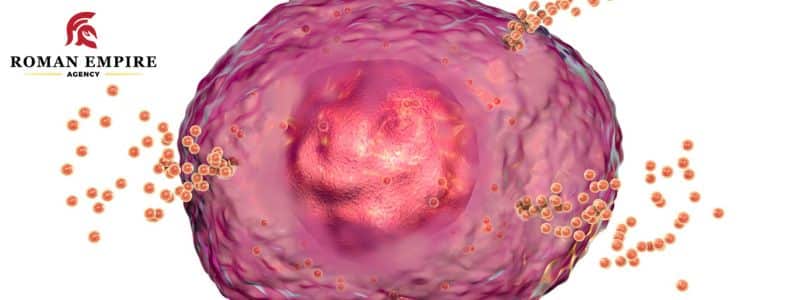
Mast cell activation syndrome (MCAS) occurs when a person experiences recurrent episodes of anaphylaxis symptoms. These symptoms can include hives, difficulty breathing, swelling, and low blood pressure, which releases mast cell inflammatory mediators.
It’s been suspected that the pathogenesis of autism spectrum disorder (ASDs) can be due to MCAS. This syndrome plays a significant role in immune response and has only been researched for less than 50 years.
In this blog, we will discuss:
- Symptoms of MCAS
- Is there a link between Autism and MCAS?
- What disorder causes mast cells?
- Can mast cell activation cause neurological problems or affect the brain?
- What hormones are linked to autism?
Symptoms of MCAS
MCAS exhibits symptoms that are similar to anaphylaxis shock. Mast cells comprise the red blood cell group that makes up the immune system. When coming in contact with an allergen, cells will send out an immune response to fight off dangerous bacteria.
Chemicals such as “histamine” are released during a reaction – and for a healthy person, this helps the body quickly heal and fight off infection. But for a person with MCAS, these chemicals have a more negative effect. With overwhelming chemicals flooding the body to soothe the immune system, a person with mast cells will often become sick. Symptoms of mast cell activation syndrome include:
- Itching or hives
- Flushing
- Chronic pain
- Mucus build-up
- Inflammation and swelling
- Abdominal pain and cramping
- Coughing and wheezing
- Lightheadedness, dizziness, or weakness
- Low blood pressure or rapid heartbeat
- GI issues such as vomiting and diarrhea
Repeated occurrences of these symptoms when coming into contact with toxins, food intolerances, or stress can indicate that you have stimulated mast cells. This disorder can be challenging to diagnose, as its symptoms overlap with multiple disorders and developmental disabilities. But, proper evaluation and management of this syndrome can ensure a better quality of life.
Is There A Link Between Autism And MCAS?

Studies have suggested a strong correlation between autism and mast cell activation. Triggers such as stress, infections, or the environment can cause perinatal MCAS. This leads to pro-inflammatory and neurotic molecules, which cause brain inflammation and ASD symptoms.
When a woman is stressed during pregnancy, mast cells may begin to form inside of her fetus. Likewise, children with autism spectrum disorders grow to become less able to handle stress and anxiety with healthy coping mechanisms.
There are shared symptoms between people with MCAS and children with ASD. This includes difficulties learning new information, regulating emotions, cognitive processing, and overall lack of mental clarity. If a person has both MCAS and ASD, they may experience heightened learning disabilities and behavioral challenges.
What Disorder Causes Mast Cells?
Mastocytosis can lead to mast cell activation syndrome. This rare condition is caused by high (and abnormal) levels of mast cells collecting within the body’s tissue or skin. This disorder is not typically found in other parts of the body but can cause severe mast cell disorders such as leukemia or sarcomas. Mental disorders such as anxiety or high stress have been known to cause mast cell degranulating.
A food allergy or food intolerance also triggers mast cells. If you are suffering from MCAS, it’s recommended that you avoid the following:
- Environmental toxins – including smoke, airborne chemicals, and heavy metals
- Specific food – including berries, citrus, chocolate, tomatoes, soy, nuts, yeast, cured meats, and canned fish
- Vinegar – including pickles and other fermented foods
- Leftover food
- Alcohol
- Fragrances
- Exercise or heat
- Medication
- Stress
Each person experiences a variety of triggers, but the most common denominator is stress. If you find yourself or a loved one reacting negatively after exposure to any of the above-listed triggers, attempt to eliminate them from your lifestyle.
Can Mast Cell Activation Cause Neurological Problems or Affect The Brain?

Mast cell activation can cause brain inflammation and neurodevelopmental disorders such as:
- Traumatic brain injuries (TBI)
- Strokes
- Multiple sclerosis (MS)
- Dementia or Alzheimer’s
- Stress and sleep conditions
- Migraines
- ADHD and ASD
These conditions can lead to headaches, mental illness (such as anxiety or depression), heightened emotional reactivity, and attention and memory changes.
Mast cells can also penetrate the blood-brain barrier (BBB)– a network of tissues and blood vessels that keep harmful substances from reaching the brain. Mast cells can break down the integrity of this barrier and cause damage. This typically leads to Multiple Sclerosis- when nerves come into contact with mast cells.
The life expectancy for someone with MCAS is the same as the current average life span- those living with this disorder can still live a full life. With attentive treatment and diagnosis, life quality can also be improved. There has yet to be a cure for this disorder, but it’s treatable with antihistamines and other chemical blockers.
What Hormones Are Linked To Autism?
Excessive hormones, specifically sex hormones, increase the risk of developing autism in the womb. Men are four times more likely to be diagnosed with autism than women and are the primary carriers of high testosterone. But, it has also been studied that high estrogen levels can likely cause ASD. Prenatal sex steroids will increase sex hormones in the body, which can lead to fetal autism.
Autistic people also have lower blood levels of oxytocin, known as the “social hormone.” This chemical promotes trust, positive social interactions, mother-child bonding, and threat response. As oxytocin aids in social skills, it’s often a chemical treatment for those with autism. Typically administered through a nasal spray, this helps the chemical reach the brain directly (as opposed to traveling through the bloodstream).






